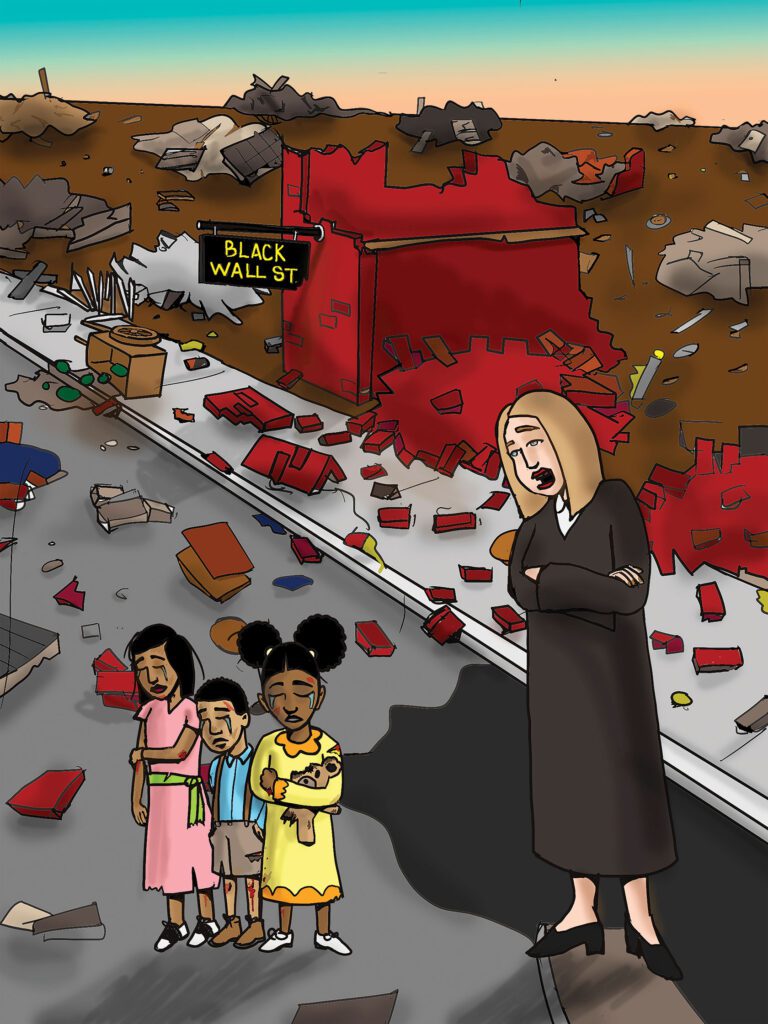
After waiting more than 100 years, three survivors of the 1921 racial massacre in Tulsa, all centenarians, have once again been the victims of injustice. Lessie Benningfield Randle, 108, Viola Fletcher, 109, and her brother, Hughes Van Ellis, 102, were plaintiffs in a long court battle against the City of Tulsa and other groups and officials seeking compensation for the opportunities taken from them when racist white residents burned the city’s Greenwood neighborhood to the ground.
Triggering the destructive massacre was the all too often false charge that a Black teenager had attacked a young white woman. This false charge was then promoted in the local daily newspaper in multiple articles that called white men to arms to defend the white woman. Almost the entire community of Greenwood, often referred to as Black Wall Street, was destroyed. Businesses, homes and churches were torched, with the assistance of airplanes of uncertain ownership that dropped gasoline or turpentine fire bombs from the sky.
In their case, the aged plaintiffs had argued that the damage inflicted during the massacre was a “public nuisance” and were seeking relief from that nuisance as well as to “recover for unjust enrichment” that others gained from the destruction. Last week, however, Tulsa County District Judge Caroline Wall found that “upon hearing the arguments of counsel and considering the briefs filed by counsel for plaintiffs and counsel for defendants,” the plaintiffs’ petition “should and shall be” dismissed, according to court records. The order barred the three from refiling their lawsuit.
The City of Tulsa, in its defense, argued that “simply being connected to a historical event does not provide a person with unlimited rights to seek compensation from any project in any way related to that historical event. If that were the case, every person connected to any historical event could make similar unjust enrichment claims against every museum or point of remembrance.”
The massacre was a calculated and coordinated attack on a thriving Black community with the intent to destroy the prosperity and steal the wealth of the people who lived there. Over the course of hundreds of years, Black Americans have suffered all too often at the hands of their white counterparts as our homes have been destroyed and our businesses and property stolen by white people who want what we had created. This massacre is one of the most graphic examples of this white racist domestic terrorism.
I suppose we should not be surprised that a judge who refers to herself as a conservative constitutionalist would dismiss the case. This is just another example of the new hard-right turn many in the judiciary have taken. It is a shame that many in our society continue to try to whitewash history and not compensate Black Americans for the atrocities we have suffered at the hands of white racist domestic terrorists.
As Tulsa moves forward into the next election cycle for judges, it is imperative that the city’s Black population hold this judge accountable by voting her out, for this ruling that continues to victimize these three survivors.
As the most senior of the plaintiffs, Viola Fletcher, said: “I have seen the best and the worst of this country … [But] I have never seen justice, and one day I pray I will.” We as Black Americans must not only pray but act, with every tool we have, to demand reparations for all that was stolen from us. We must continue to demand justice in every case and every forum. Here in Boston, for instance, we must make our voices heard before the city’s Reparations Task Force, which is holding public meetings.
In 2003, a previous lawsuit seeking reparations for the Tulsa massacre was filed in federal court in Oklahoma by a group that included Harvard Law Professor Charles Ogletree, civil rights attorney Johnnie Cochran and historian John Hope Franklin, a son of Greenwood. That case was also dismissed — by a district court, appeals court and Supreme Court — but on the grounds that the statute of limitations had expired. At the time, there were about 170 survivors of the Tulsa massacre alive.
Time is running out for these three Tulsa survivors to receive justice. Let’s not let their loss be forgotten, for surely they deserve justice in their lifetimes.







